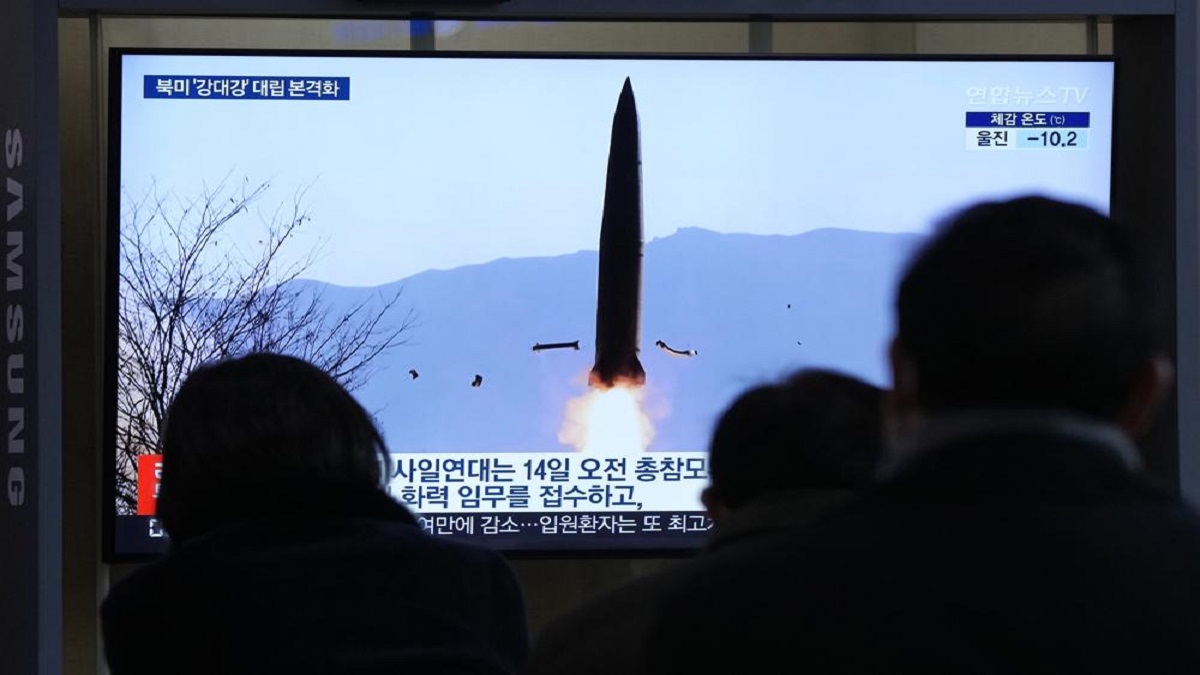Highlights
- North Korea said it'll consider restarting “all temporally-suspended activities”
- North Korea has been ramping up its weapons demonstrations recently
- Kim announced unilateral suspension of his nuclear, intercontinental ballistic missile tests in 2018
Accusing the United States of hostility and threats, North Korea on Thursday said it will consider restarting “all temporally-suspended activities” it had paused during its diplomacy with the Trump administration, in an apparent threat to resume testing of nuclear explosives and long-range missiles.
North Korea’s official Korean Central News Agency said leader Kim Jong Un presided over a Politburo meeting of the ruling Workers’ Party where officials set policy goals for “immediately bolstering” the North’s military capabilities to counter the Americans’ “hostile moves.”
Officials gave instructions to “reconsider in an overall scale the trust-building measures that we took on our own initiative...and to promptly examine the issue of restarting all temporally-suspended activities,” the KCNA said.
The North’s Foreign Ministry had already warned of stronger and more explicit action after the Biden administration last week imposed fresh sanctions over the North’s continued missile testing activity. The latest North Korean threat came as the U.N. Security Council scheduled a closed-door meeting for Thursday to discuss North Korea and non-proliferation matters.
The North has been ramping up its weapons demonstrations recently, including four rounds of missile launches just this month, amid a prolonged freeze in nuclear diplomacy with the United States.
Experts say Kim is reviving Pyongyang’s old playbook of brinkmanship to extract concessions from Washington and neighbors as he grapples with a decaying economy crippled by the pandemic, mismanagement and US-led sanctions over his nuclear ambitions.
Kim announced a unilateral suspension of his nuclear and intercontinental ballistic missile tests in 2018 as he initiated diplomacy with then-President Donald Trump in an attempt to leverage his nukes for badly needed economic benefits.
Their summitry came after a provocative run in North Korean nuclear and intercontinental-range ballistic missile testing in 2017 that demonstrated Kim’s pursuit of an arsenal that can viably target the American homeland and resulted in him exchanging threats of nuclear annihilation with Trump.
But negotiations have stalled since the collapse of their second summit in 2019, when the Americans rejected North Korea’s demand for major sanctions relief in exchange for a partial surrender of its nuclear capabilities.
At the end of that year, Kim vowed to further bolster his nuclear arsenal in face of “gangster-like” U.S. threats and pressure and declared a “frontal breakthrough” against sanctions while urging his people to stay resilient in a struggle for economic self-reliance. He then said the North was no longer obligated to maintain its suspension on nuclear and ICBM tests, which Trump touted as a major foreign policy achievement.
However, the pandemic thwarted many of Kim’s economic goals as the North imposed a lockdown and halted most of its trade with China, its major ally and economic lifeline.
North Korea appeared this month to have resumed railroad freight traffic with China that had been suspended for two years.
North Korea conducted its sixth and last test of a nuclear explosive device in September 2017 and its last launch of an ICBM was in November that year.
Some experts say that the North could dramatically raise the ante in weapons demonstrations after the end of February’s Winter Olympics in Beijing. They say Pyongyang’s leadership likely feels it would take a dramatic provocation to move the needle with the Biden administration, which has offered open-ended talks but showed no willingness to ease sanctions unless Kim takes real steps to wind down his nuclear and missile program.
“The present U.S. administration persists in maneuvers to deprive the DPRK of its right to self-defense. All the facts clearly prove once again that the hostile policy towards the DPRK will exist in the future, too as long as there is the hostile entity of U.S. imperialism,” the KCNA said in its report about the Politburo meeting, using an abbreviation of North Korea’s official name, the Democratic People’s Republic of Korea.
It said the Politburo members unanimously recognized the need for North Korea to be prepared for a long-term confrontation with the United States and called for practical measures to “more reliably and effectively increase our physical strength for defending dignity, sovereign rights and interests of our state.”
Kim in recent years had showcased some new weapons he may wish to test, including what appeared to be North Korea’s largest-ever ICBM that was rolled out during a military parade in October 2020.
He also issued an ambitious wishlist of sophisticated weaponry early last year while setting a five-year plan to develop military forces, which included hypersonic missiles, solid-fuel ICBMs, spy satellites and submarine-launched nuclear missiles.
If the North does stage another nuclear test, it may use that event to claim it acquired an ability to build a nuclear warhead small enough to fit on a purported hypersonic missile it tested twice so far this year, experts say.
Last week, the U.S. Treasury Department imposed sanctions on five North Koreans over their roles in obtaining equipment and technology for the North’s missile programs, in its response to North Korea’s earlier tests this month.
The State Department ordered sanctions against another North Korean, a Russian man and a Russian company for their broader support of North Korea’s weapons of mass destruction activities. The Biden administration also said it would pursue additional U.N. sanctions over the North’s continued tests.
ALSO READ: North Korea fires projectile in 4th launch this month
ALSO READ: North Korea fires fresh missiles in response to US sanctions

